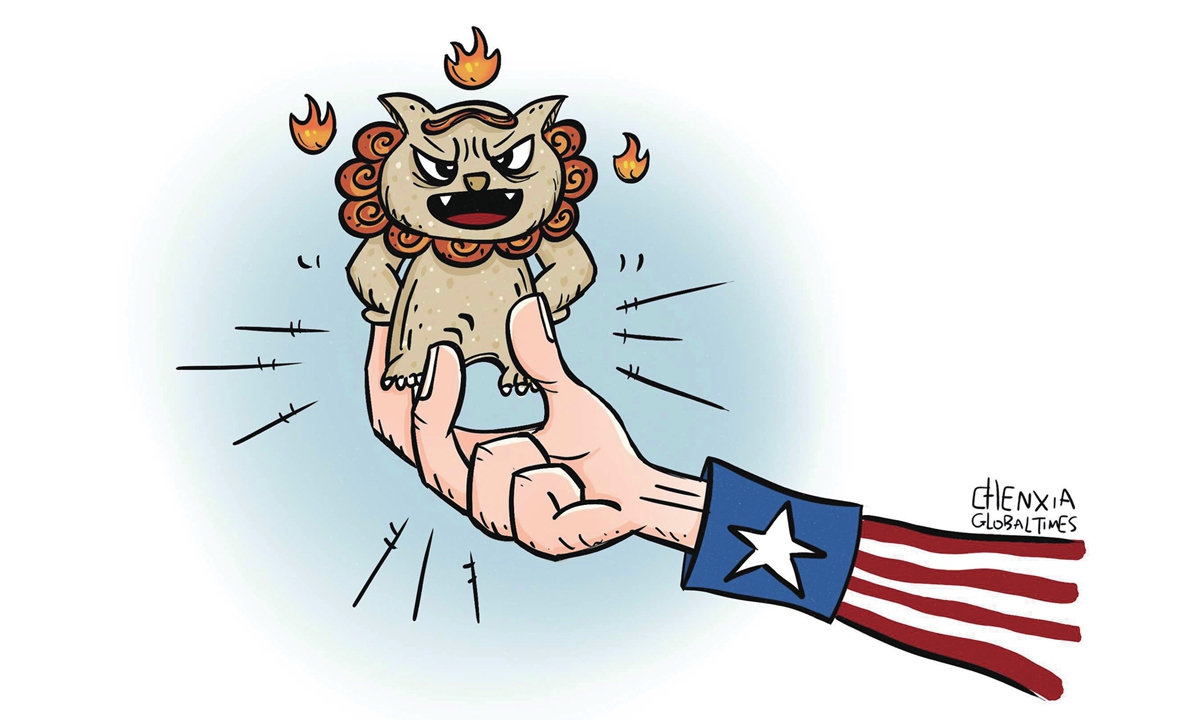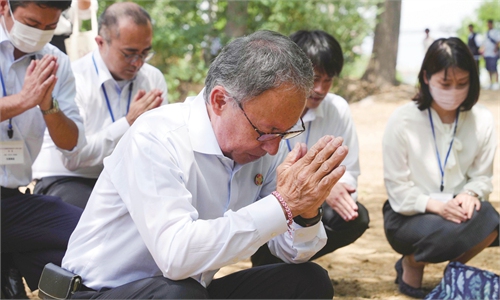
Illustration: Chen Xia/GT
During his visit to China, Denny Tamaki, governor of Okinawa Prefecture of Japan, on Tuesday paid his respects at the site of Ryukyu Kingdom cemetery in Zhangjiawan township in Beijing's Tongzhou district. In the Ming Dynasty (1368-1644) and Qing Dynasty (1644-1911), Zhangjiawan was an important wharf of the Beijing-Hangzhou Grand Canal and an entrance to Beijing from other regions. During the Qing Dynasty, most of the Ryukyu residents who died of illness were buried there, totaling 14 persons including envoys and students.Historical exchanges between China and Okinawa Prefecture have a long history. Okinawa was once an independent Kingdom known as Ryukyu. Apart from the Ryukyu cemetery site in Zhangjiawan township in Beijing's Tongzhou district, the Ryukyu people have left footprints in many places in China, including the Ryukyu-kan, institutions serving as homes and bases of operations for Ryukyuan missions in early modern Fuzhou, Fujian province, and Ryukyu Tomb in Fuzhou. When paying respects at the Ryukyu cemetery site, Tamaki expressed that he would be "very grateful" if the occasion of his visit could bring a wave of searching for Ryukyu relics in China.
In history, Ryukyu was once a vassal state of China. The Ryukyu kings were consecutively conferred by the Chinese emperors, and envoys were sent to China to pay tribute and acknowledge allegiance to the Chinese emperor. Ryukyu was under comprehensive influence of China in terms of political, cultural, and socio-economic aspects. However, China did not interfere in Ryukyu's internal affairs and allowed it to have autonomy. Subsequently, Ryukyu Kingdom went through periods of independence (1429-1879), Japanese colonization (1879-1945), and American occupation (1945-1972). On May 15th, 1972, the US transferred the "administrative rights" of the Ryukyu Islands to Japan, ending a 27-year-long occupation. However, the Okinawan people, who have experienced a tumultuous history, have never abandoned the uniqueness of The Ryukyu ethnic group and have strengthened their self-identity through use of various cultural symbols.
The highly anticipated opening match of the 2017 Japan Professional Basketball League took place between team Tokyo and team Okinawa. The Okinawa team, named "Ryukyu Golden Kings" in Japanese, stood out with their name, which was chosen through a public vote by the residents of Okinawa rather than being named after the prefecture like other teams. The official website of the club introduced the team name as follows: The name "Ryukyu Golden Kings" is derived from the historical Ryukyu Kingdom, which had close relations with China and Japan and actively engaged in trade with neighboring countries. Similar cases abound, such as the Worldwide Uchinanchu (Ryukyu people) Festival, held every five years and the revival of Ryukyu tattoos (Hajichi), which were explicitly prohibited during the Japanese colonial period, as a cultural symbol in contemporary times.
In 1972, Okinawa "returned" to Japan, but the relationship between the Okinawa Prefectural government and the government of Japan has been delicate. They often have different opinions on issues that involve the core interests of the Ryukyu people who have confronted Tokyo through protests, marches, and legal actions. The Ryukyu ethnic group's distrust toward the Japanese government is likely related to Japan's historical sacrifice of Ryukyu's political and economic interests during the colonial period.
In contemporary times, Okinawa Prefecture bears important defense responsibilities for Japan. It is reported that the current total strength of the US forces stationed in Japan is about 38,000, making it the largest overseas US military presence. However, Okinawa, which accounts for only 0.6 percent of Japan's land area, contains over 70 percent of the US military bases in Japan. The Ryukyu people live under the constant shadow of war, fearing that if the Asia-Pacific or global situation becomes unstable, Okinawa will be the first to face risks.
From an economic perspective, Okinawa has consistently had the lowest per capita income in Japan. In the 1950s, the US military began constructing permanent bases in Okinawa. The construction of these bases required a large workforce, and it is recorded that at its peak, the US military employed 40,000 to 50,000 Ryukyu people as workers for military bases.
After the US and Japan agreed on the "transfer of Okinawa", the US military gradually laid off the staff at the base in a phased manner. The Japanese government has carried out a plan to revitalize Okinawa, but with little success. In addition, the issue of forced land acquisition by the US military base in Okinawa remains unresolved, making it difficult for Okinawa's economy to improve in the short term.
The heavy burden of US military bases and the militarization of the Japanese southwest Islands have made the identity of the Ryukyu ethnic group increasingly complex. This has given rise to a wave of revival of ethnic traditional culture in Ryukyu society. Under the pressure of the current US-Japan alliance and the presence of US military bases, the Ryukyu ethnic group constantly seeks its self-expression, which further strengthens the memory of their own traditional culture.
The author is assistant researcher at the Institute of Japanese Studies, Chinese Academy of Social Sciences. opinion@globaltimes.com.cn

